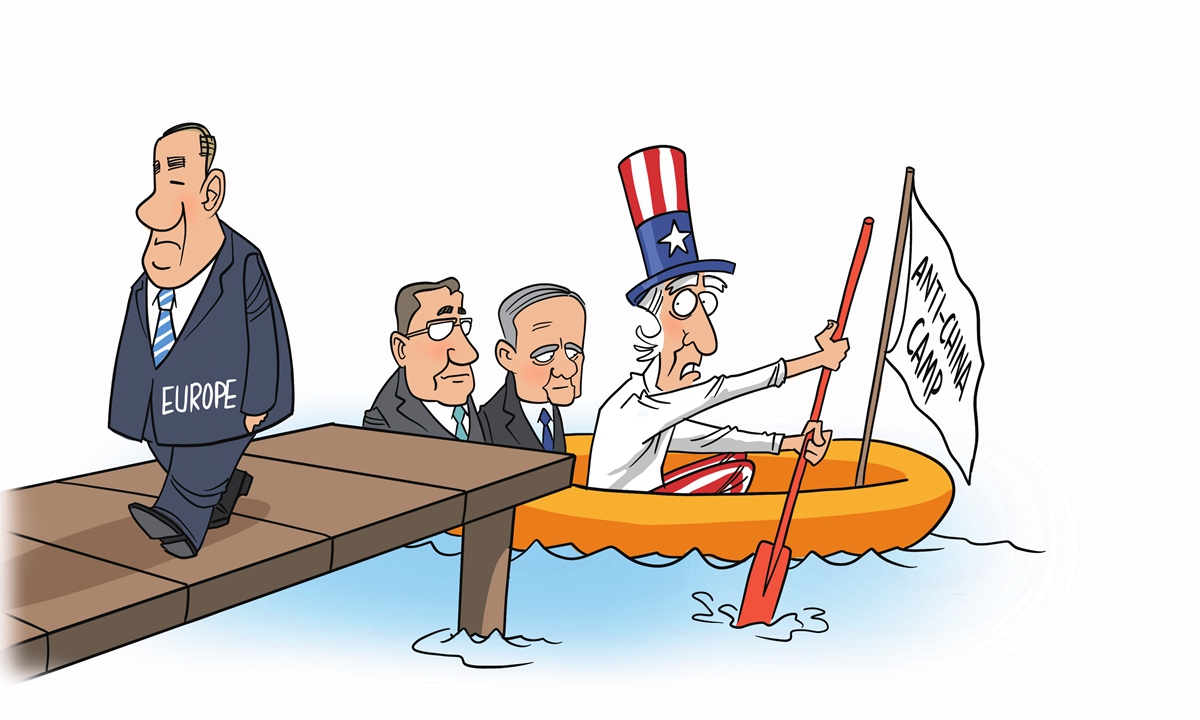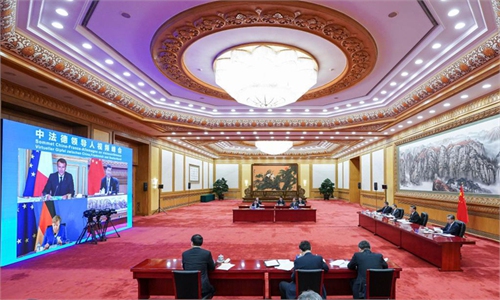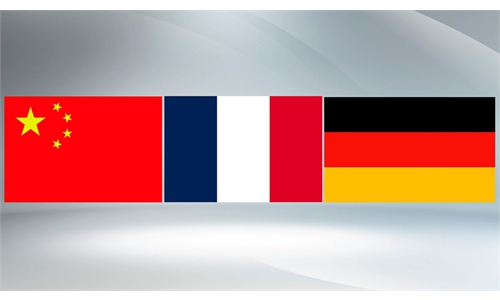
Illustration: Liu Rui/GT
Chinese President Xi Jinping held a virtual summit with French President Emmanuel Macron and German Chancellor Angela Merkel on Monday. This is the three leaders' second summit in three months.Washington has been urging the EU to cooperate with its strategy to contain China, wooing the EU to follow the US' human rights diplomacy, and some European countries have made moves to follow the US on certain issues. However, European countries have not tied themselves to the US chariot, as Washington had expected.
Some of the EU's actions against China, especially human rights issues, are partly due to European countries' traditional position toward these questions. Besides, some extreme anti-China forces in the EU have been hyping China-related issues for their political interests. Washington has indeed fueled the flames, but the EU has not completely followed the US. It is clear that most European countries are relatively practical. They do not believe it is worthwhile to sacrifice China-EU relations to pursue the so-called human rights diplomacy.
Moreover, China-EU relations are not the same as China-US relations. European countries may stand with Washington on some issues, but they will not act in line with all of them. After all, the US and EU have different views on China. The US has hyped the return of the transatlantic alliance after US President Joe Biden's trip to Europe in June. But this is more like Washington's wishful thinking since the EU's feelings are not exactly the same.
First, although there are many similarities in terms of values and systems between the US and the EU, the latter is attaching more importance to strategic autonomy. It is not blindly following the US' suit. Besides, Washington is also losing its overall dominance. This means US-EU relations will not develop exactly as the US wants.
The most fundamental reason for this is clear: China's importance is rising. Many issues discussed in the summit, including the three leaders' support in the China-EU Comprehensive Agreement on Investment, show that Germany and France attach great importance to cooperation with China. From the perspective of the overall global situation, these countries must maintain relations with China. It is impossible to build an alliance that excludes China.
The US does not have the power to make Europe sacrifice for its hegemony anymore. The Cold War era has long gone, and US' strength and influence have declined. All hegemony will inevitably decline, and the US' control over allies has also declined. The rift between the US and the EU has been expanding since the Trump administration. Biden's coming into power has not fundamentally changed Europe's doubts either.
The US labels China as a strategic rival and regards China as a challenge in all aspects. But Europe can still cooperate with China on many global issues. This may seem to contradict what NATO leaders said in June: Beijing presents "systemic challenges" for the transatlantic security alliance. In fact, it illuminates the diversity and flexibility of European thoughts on China.
This is reflected in Macron and Merkel's postures to downplay NATO wording on China. In fact, EU-China relations combine cooperation and competition. This is markedly different from the US' complete China containment strategy.
What is more, the Biden administration has been trying to unite allies to confront China. The US cares more about blocking China than really repairing relations with the EU. The EU is obviously well aware of this. It does not want to be used as a strategic tool against China. In essence, it does not want to take sides.
It is difficult for the Biden administration to completely repair US' alliances. The US and the EU have difficulties with strategic coordination. The two sides also have conflicts regarding trade, and how to handle China and Russia. Washington has tried to lead the establishment of a values-based alliance, but this will only be an empty talk. Washington will not make huge financial and personnel investments in such a values-based alliance. In response, the EU will not follow suit if it does not see substantial support from Washington.
More importantly, China is not key to repairing US-EU relations - as Washington seems to expect. This is quite the opposite: China-related issues highlight the differences and contradictions between the US and the EU. The harder the US presses the EU, the more the EU feels it should have its own views on China. It makes cooperation with China indispensable. US-EU relations will not return to the good old days in the short run.
The author is an assistant research fellow at the China Institute of International Studies. opinion@globaltimes.com.cn


